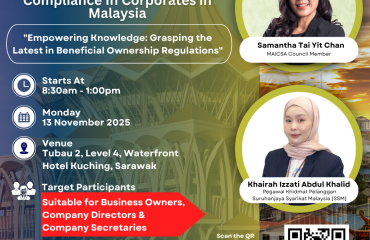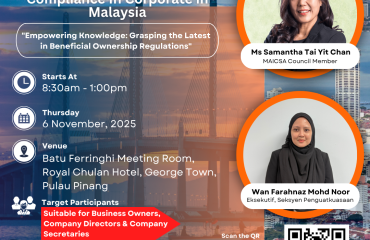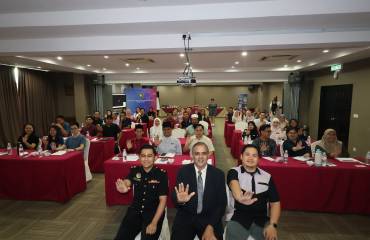Corporate secrecy, global money laundering makes it harder for emerging economies to fight corruption
Kuala Lumpur, 5 December 2014 – “Corruption is a problem for all economies, requiring leading financial centres in the EU and US to act together with fast-growing economies to stop the corrupt from getting away with it”, Transparency International said today.
In the 20th edition of the Corruption Perceptions Index (CPI), the score for Malaysia improved marginally with a score of 52 out of 100 (2013: 50) and ranks 50 out of 175 countries up from a ranking of 53 last year.
“For 2014, the CPI scores and ranks 175 countries based on the perceived level of corruption in the public sector. The Indicator of corruption is determined by expert assessments and opinion surveys” explained Dato’ Akhbar Satar, President of Transparency International-Malaysia (TI-M). Dato’ Akhbar added that “The CPI is not only about comparing bribes reported, the number of prosecutions or corruption court cases but also how effective investigators, prosecutors, the courts or the media are in investigating and exposing corruption.”
China (with a score of 36 out of 100), Turkey (45) and Angola (19) were among the biggest fallers with a drop of 4 or 5 points, despite average economic growth of more than 4 per cent over the last four years.
More than two thirds of the 175 countries in the 2014 Corruption Perceptions Index score below 50, on a scale from 0 (perceived to be highly corrupt) to 100 (perceived to be very clean). Denmark comes out on top in 2014 with a score of 92 while North Korea and Somalia share last place, scoring just eight.
Malaysia ranked second behind Singapore (CPI score: 84) among ASEAN countries. The worst performers are Myanmar and Cambodia with identical scores of 21.
The Malaysian Corruption Perceptions Index is based on 8 different surveys and country assessments from independent institutions carried out among experienced observers such as business leaders from Multinational Companies (MNCs), local corporates and country analysts gathered in the past 24 months.
Among the recommendations put forth by TI-M stressed upon a comprehensive regulation on political financing. It is imperative that political contributions be channeled into party accounts and not individuals. Dato’ Akhbar stressed that “both political divides must comply with these recommendations.” He added that there must be stronger political will whereby Section 23 and 36 of the MACC Act be amended to close loopholes for abuse.
Likewise, the Government is urged to establish a public registry of beneficial owners’ information for all Malaysian companies to uncover the real owners. To achieve a more open, transparent, effective and accountable Government which is responsive to citizens by utilizing cutting edge technology to fight graft. Malaysia’s score can be further helped by open government where the public can hold their leaders to account, while a poor score is a sign of prevalent bribery, lack of punishment for corruption and public institutions that don’t respond to citizens’ needs.
In response to the Auditor-General’s reports, TI-M recommends that a Multi-Disciplinary Task Force be established by the A-G Department that works closely with the Integrity Units of each Ministries. To be effective, the Task Force must possess intervention powers. Additionally, all projects and contracts should be awarded through open tenders and competitive bidding.
Corruption in emerging economies
China’s score fell to 36 in 2014 from 40 in 2013, despite the fact the Chinese government launched an anti-corruption campaign targeting corrupt public officials. The government has recognized the need to follow officials who hide ill-gotten gains overseas. This January 2014, leaked documents revealed 22,000 offshore clients from China and Hong Kong, including many of the country’s leaders.
The score matches a poor performance by Chinese companies in Transparency International’s recent report on corporate disclosure practices where all eight Chinese companies scored less than three out of ten.
Corruption and money laundering are also problems for the other BRIC countries. This year has seen questions raised related to a major oil company using secret companies to bribe politicians in Brazil (which scores 43), questions about Indians (38) using bank accounts in Mauritius (54) and Russians (27) doing the same in Cyprus (63).
Countries on top must fight global corruption
Transparency International called on countries at the top of the index where public sector corruption is limited to stop encouraging it elsewhere by doing more to prevent money laundering and to stop secret companies from masking corruption.
While top performer Denmark has strong rule of law, support for civil society and clear rules governing the behaviour of those in public positions, it also set an example this November, announcing plans to create a public register including beneficial ownership information for all companies incorporated in Denmark. This measure, similar to those announced by Ukraine and the UK, will make it harder for the corrupt to hide behind companies registered in another person’s name.
The anti-corruption group is currently running a campaign to “Unmask the Corrupt”, urging European Union, United States and G20 countries to follow Denmark’s lead and create public registers that would make clear who really controls, or is the beneficial owner, of every company.
End.
Transparency International-Malaysia is an independent, non-governmental and non-partisan organisation committed to the fight against corruption.
Website: www.transparency.org.my







